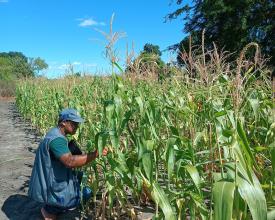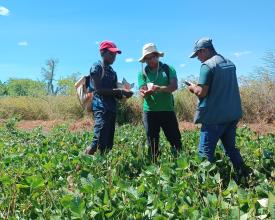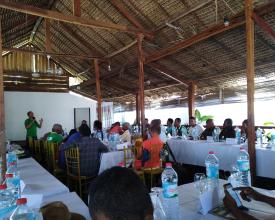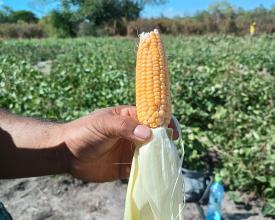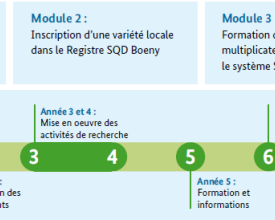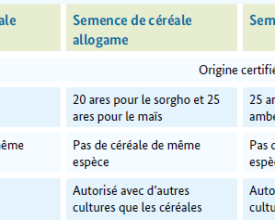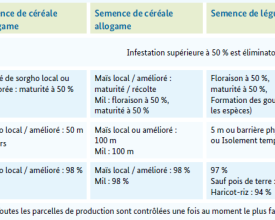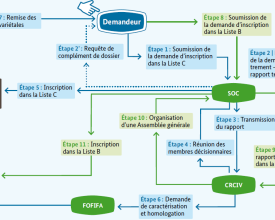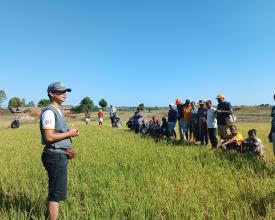
Declared Quality Seed System (DQS) in Madagascar: A sustainable approach to improving agricultural resilience
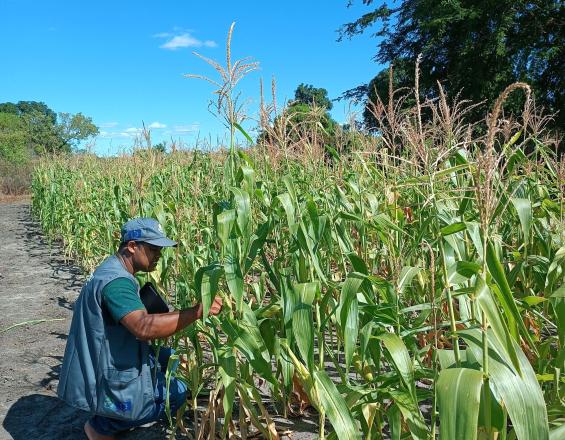
Agriculture, the driving force behind Madagascar's regional economy, relies on producers having access to high-performance seeds adapted to local agro-ecological conditions. With this in mind, the SQD is an innovative approach aimed at improving the production and availability of quality seeds in the Boeny region. By providing training for seed multiplication farmers, ensuring better distribution of adapted varieties, and strengthening local seed market structures, this system helps to meet agroecological challenges while supporting regional agricultural development. The main aim of the SQD system is to strengthen the existing normative framework for seeds, promote high-performance local varieties, and enhance the skills of seed multiplication farmers (PMS) to enable them to apply SQD standards effectively.
Contexto
Défis à relever
Environmental: The gradual disappearance of local varieties threatens agricultural biodiversity and reduces the adaptability of crops to changing climatic conditions. The absence of standardized seed-saving practices accentuates genetic erosion and the loss of plant genetic resources adapted to local agro-ecological specificities.
Social: Farmers have limited access to quality seeds, which affects their yields and food security. The seed market's lack of training prevents widespread adoption of good farming practices and reinforces producers' dependence on low-quality seeds from the informal market.
Economic: The high cost of certified seed makes it difficult for many smallholders to acquire. The lack of infrastructure for the production and distribution of quality seeds limits their availability on local markets, thus hampering farmers' competitiveness.
Ubicación
Procesar
Summary of the process
The development of (1) SQD certification standards guarantees a structured framework adapted to local realities. These standards facilitate (2) the registration of local varieties, ensuring their official recognition after rigorous testing (DUS and VATE). At the same time, (3) training for seed multiplication farmers enables them to apply these standards and improve their farming practices. The interaction between these elements ensures the production of quality seeds, strengthens agricultural resilience and structures the local seed market. The involvement of institutions and producers guarantees the sustainability and expansion of the system.
Building Blocks
Elaboration and validation of SQD seed production standards
Seed production standards in SQD certification are one of the special features of the system, and the main reason for its introduction. In fact, SQD standards are more flexible and take concrete account of the local context in which the seed is produced. In the case of the Boeny region, the basic standards adopted for the production of SQD-certified seed mainly concern :
- Cultivation rules: origin of the mother seed; spatial isolation of the cultivation field from any undesirable pollen; crop precedent; possible crop association; phytosanitary status of plants in seed multiplication fields.
- Field controls: the number of field controls must be carried out during the period of the cropping calendar when the distinctive characteristics of the varieties are easiest to notice; spatial isolation of the crop field; temporal isolation by a shift in flowering days if spatial isolation is not possible; varietal purity, i.e. the homogeneity of varietal characteristics of crops in the field.
- Technological standards verified in the laboratory to ensure seed quality: maximum seed water content; specific purity; varietal purity; germination rate; number of generations.
- Batch controls in storage warehouses and the maximum quantity of a batch of seed.
Enabling factors
- Supervision by the Service Officiel de Contrôle et de Certification (SOC) to guarantee the credibility of the standards.
- Active participation of regional players, notably the Direction Régionale de l'Agriculture et de l'Élevage (DRAE), FOFIFA, farmers' organizations and the Comité Régional Consultatif d'Inscription des Variétés (CRCIV).
- Adaptation of standards to take account of local realities and producers' constraints.
Lesson learned
- Validation of standards requires a participatory process involving various stakeholders to ensure their acceptance and applicability.
- Validating standards through a structured process of group work, followed by plenary feedback, has proved effective in ensuring a solid consensus on the results.
- A balanced representation of agro-ecological zones is essential to ensure widespread adoption.
- The explicit consideration of agro-ecological zones was essential to guarantee the representativeness, credibility and operational relevance of the standards adopted.
Registration of a local variety in the SQD Boeny Register
Any new variety can only be marketed if it is registered in the official catalog or in the register of seeds of declared quality. To obtain this registration, the variety must satisfy the criteria of two types of official test: Distinctness, Uniformity and Stability (DUS) for all species, and VATE (Agronomic, Technological and Environmental Value) for agricultural species. DUS verifies that the variety is distinct from varieties of common knowledge, uniform and stable, i.e. that it retains its phenotypic characteristics from generation to generation. VATE provides essential information on the variety's agronomic and qualitative characteristics.
In order to register a local, traditional or farmer's variety in the SQD Boeny Register, several steps must be followed according to the variety registration manual. The Register of species and varieties used in the SQD system contains the list of seeds and seedlings of varieties that can be produced under the certification system in the Boeny region and marketed on regional territory and, if authorized by the SOC, on national territory.
Enabling factors
- Close cooperation between the FOFIFA research center and the SOC to carry out DUS and VATE tests.
- The use of the Boeny region's agro-ecological diversity, in particular the baiboho toposequence, to speed up testing by carrying out two growing seasons per year.
- Involving farmers in variety characterization and homogenization activities.
Lesson learned
- Variety registration is a long and critical stage, requiring rigorous planning and effective coordination between the various players involved.
- DUS and VATE tests must be analyzed separately, but implemented simultaneously to optimize time.
- Regular communication of results to CRCIV decision-makers is crucial to ensure the transparency and efficiency of the process.
Resources
Training farmers and seed multipliers in the SQD system
During the implementation of this approach, collaboration with the Ministry of Agriculture was undertaken to train farmers who were members of partner groups to approve their seed establishments. Under the new certification system, the approval of a seed establishment can be carried out in parallel with seed certification. The standards applied in this system differ from those used in conventional seed production. The training course aims to clarify these differences and highlight the advantages of the new production framework. It takes place over four consecutive days, with three days of classroom sessions and half a day devoted to practical work in the field. Training is provided exclusively by specialists and qualified technicians. The main objective is to train farmers in all aspects of seed production, control, certification and marketing. The practical training was carried out on the premises of a farmer benefiting from the program. Participants were shown a simulation of the principle of field controls.
Enabling factors
- The commitment of the SOC and local NGOs to organizing training courses adapted to the realities of growers.
- A combination of theoretical and practical sessions, with demonstrations in the field.
- The involvement of multiplier farmers and agricultural technicians to ensure a sustainable transfer of skills.
Lesson learned
- Joint training of technicians and multiplier farmers, gradually including relay farmers, has enabled better knowledge sharing and effective dissemination of technical skills.
- Ongoing technical support, including appropriate plot selection, field cleaning, optimal harvest timing and rigorous management of post-harvest stages, contributes significantly to the final quality of certified seeds.
- Regular capacity building in certified seed production (rice, maize, vegetables, dry grains) under the conventional and SQD certification systems is essential to the success of the process.
Impacts
Environmental :
- Promotion of local varieties: certification favors local varieties that prove more efficient and resistant to climate change and pests, reducing the use of chemical inputs and supporting agricultural biodiversity.
Social :
- Institutional strengthening: the creation of the CRCIV as a multi-stakeholder platform strengthens local and regional institutions and fosters a continuous exchange of information.
- Support for innovation: CRCIV supports innovation in research, particularly for local and new varieties.
- Improving food security: Improving seed quality increases yields, thereby strengthening food security.
Economic:
- Increased yields: the use of certified seeds significantly improves yields.
- Increased income for growers: certified seeds provide growers with additional income. The return on investment (0.9) confirms the profitability of the model, requiring cost optimization and market diversification to ensure its sustainability.
- Market access: the SQD system facilitates access by seed producer groups to regional and national markets, thereby promoting economic integration.
Beneficiaries
Local communities and their farmers, who have access to quality seeds
Seed producers (PMS), who receive training and technical support
Global Biodiversity Framework (GBF)
Sustainable Development Goals
Story
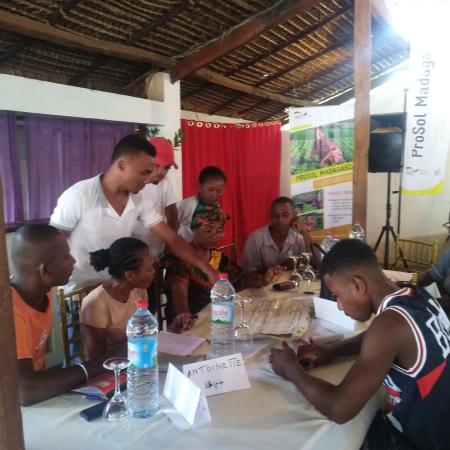
Through the implementation of the SQD in Boeny, FOFIFA benefits from both technical and financial support. The implementation of the SQD declared quality seed system (with its processes) for the Boeny region, has made it possible to enhance farmers' traditional knowledge of agro-biodiversity.
"Local varieties or peasant seeds are seeds selected by peasants, adapted to their terroirs and production methods and presenting qualitative characteristics deemed interesting, whose use and tradition enable them to be accepted as suitable and desirable food sources".
At present, they have become rare. "Certain social, customary or prestige motivations justified the choices, notably for food security, these local varieties form the basis of varied diets, extending the range of staple foods. Many of these plants are drought-resistant, can be grown without costly inputs and are easy to store. They increase family and national incomes, help reduce household food and financial vulnerability, but also contribute to the erosion of biodiversity".
By developing and valorizing these varieties, our country could increase its food supplies and reduce its imports by the same amount, otherwise it would be forced to import large quantities of food products to fill the gaps.
"Seeds play a vital role in crop production, helping to boost output by 10-30% depending on the crop. However, seed is inextricably linked to quality.
FOFIFA North-West Management - Boeny Region - Madagascar
